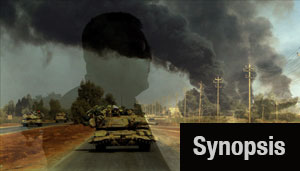Warriors Return
Diné Veterans of Canyon de Chelly
Contact for screenings and DVD's:Marcia Rock 646 489 6867
marcia.rock@nyu.edu
www.marciarock.com
Navajo Contact:
Julius Tulley
juliusct@hotmail.com
Warriors Return introduces you to five Navajo veterans who served their country well and in spite of obstacles define the warrior spirit. Diné (Navajo) warriors serve in the military to defend their land since, in their view, the United States is still Indian land. They have served proudly and bravely, from the Code talkers in WWII, to the Army Rangers in Viet Nam, to the Army and Reserves who served in Iraq and Afghanistan. But their dedication and courage in battle does not protect them when they return home. Many were afraid of losing limbs; they did not anticipate the psychological damage from Post Traumatic Stress.
Healing from PTSD is compounded for Navajo and many rural veterans by the problems of traveling long distances to receive care, unemployment, lack of housing, and alcohol abuse. Fortunately, many find help through strong women, traditional healing and western talk therapy to create a new normal. (130 Words)
Credits:
Produced by
Marcia Rock and Peter Williams
Director, Camera, Editing,
Marcia Rock
Traditional Music by
Travis Terry
Additional Music & Sound Design by
Patricia Lee Stotter
Still Photographs
Peter Williams
30 minutes
Producer/Director/Editor
Marcia Rock is an independent filmmaker who has produced many documentaries on women's issues. Her recent documentary, co-produced with Patricia Lee Stotter, is SERVICE: When Women Come Marching Home, carried by 85% of Public TV Stations. "Salt Harvesters of Ghana" (2007) captures the dignity of women working in a grueling landscape. It won best short at the Newburyport Documentary Film. "Writers' Rooms: The Making of a Mural" (2008) follows painter Elena Climent's research of six American writers' workspaces. Her documentary on the changing role of women in Northern Ireland, "Daughters of the Troubles: Belfast Stories" (1997) won many awards including the AWRT Grand Documentary Award. She has produced several pieces on New York City and writers. McSorley's New York won an Emmy in 1987. "Village Writers: the Bohemian Legacy" (1990) recounts the literary history of Greenwich Village. Reynolds Price: a Writer's Inheritance (1989) explores the powerful relationship between family history and art. Rock's films have also gone in more personal direction. "Dancing with My Father" (2003), ponders how adult love is shaped by what a child learns at home and "Surrender Tango" (2006) compares the rules and roles of tango with contemporary relationships. Rock is a professor and Director of News and Documentary at the NYU Arthur Carter Journalism Institute. She is co-author with Marlene Sanders of, Waiting for Prime Time: The Women of Television News. Her work has been featured on Public Television and cable.
Veterans in the Film:
Teddy Draper, US Marines, Code Talker WWII.
Don Bizadi, 75th Army Ranger Regiment, Viet Nam
Lee Chee, 28th Army Infantry, Viet Nam
Julius Tulley, Third Infantry Division, US Army, Iraq
Joseph Jones, US Reserves, Arizona National Guard, Iraq
Logline (60 words):
Navajo warriors have served proudly and bravely, from the Code talkers in WWII, to the rangers in Viet Nam, to the many who served in Iraq and Afghanistan. Their dedication and courage in battle does not protect them from Post Traumatic Stress when they return home. Strong women, traditional healing combined with western therapy has brought many back to a new normal.
Long Description (435words):
Navajo Americans serve in the military to defend their traditional Diné Navajo land, the United States. Their courage and bravery in war does not prepare them for the battle back home to reclaim their minds injured by Post Traumatic Stress. Strong women, traditional healing and western talk therapy help them find their way back to loving and productive lives.
Navajo Americans have served proudly from the Code talkers in WWII, to the Army Rangers in Viet Nam, to those on the frontlines of Iraq and Afghanistan. Most enlist; few are officers. The Navajo serve in the military in greater proportions relative to their population numbers. In 2009, the Pentagon estimated that 1.6% of the armed forces were Native American compared to their being only 1% of the US population. The military is also a way to cope with the pressures of unemployment, lack of housing and poverty on the reservations.
The Navajo Code Talkers in World War II used their Navajo language to transmit secret code, indecipherable to the enemy. Teddy Draper was one of them. He grew up in the traditional way, living in a Hogan and herding sheep in Canyon de Chelly before it was made a national park. He didn’t learn English until he was 13.
A large number of Navajo fought in Viet Nam where their agility and bravery made them natural jungle warriors. Don Bizadi was an Army Ranger and part of an ambush team. Lee Chee earned the Bronze Star for delivering ammunition under fire to members of his 28th Army Infantry. Julius Tulley was part of the Army forces that fought their way into Baghdad and Joseph Jones helped provide support for the troops in Iraq as part of the Reserves and later the Arizona National Guard.
All these veterans returned home with Post Traumatic Stress and continue to cope with it today. These are exceptional men who faced down alcoholism, depression and unemployment with the help of strong women in their lives, traditional ceremonies and talk therapy. Getting help is not easy for rural veterans. There are no local agencies on the reservations approved to accept VA medical or home loan applications so veterans must travel 5 hours to apply in Phoenix. The VA is slow in recognizing and paying for innovative and effective healing that combines talk therapy with traditional healing like sweat lodges and tobacco ceremonies.


